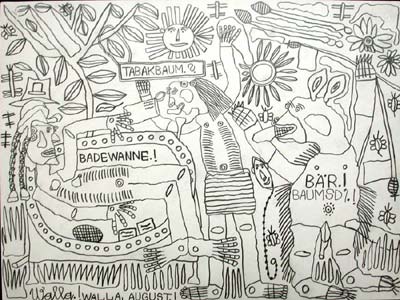

August Walla
TABAKBAUM.?
Bleistift
1977
30 x 40 cm
(jpg from Galerie Altnöder, © Haus der Künstler, Gugging)
The dark side of language |
| Since Noam Chomsky, we recognize human language as a signing system operating on a limited number of symbols, recombining them in several logical categories to an indefinite number of meaningful phrases. A characteristic feature of human language is its limitless versatility. Day for day, each of us speaks sentences that have never been spoken before. And I would bet my head on it, that even in this short paragraph I'm just about to finish, there is at least one sentence that has never been written before (most likely this last one). |
| I guess, we all are endowed with a natural drive for exploring the world around us. We all are steadily on the hunt for new impressions, for the unknown, for views never seen before, for sounds never heard before. You may call it curiosity, interest in adventures, restlessness, hunger for knowledge. No borders limit our fantasy. Myriads of phrases, that have never been spoken before, are waiting to be spoken, and myriads of thoughts are waiting to be thought. In light of this unlimitness, we may start to wonder why, still, humans share so many views and thoughts with each other. |
| In principal, any human being in this world should be able to exchange at least some meaningful information with any other human, even if we may have to resort to the signing of very basic facts related to our physiology. However, once we leave this body-talk level, proper understanding will depend on social conventions. In each society, people agree on the use of words in certain contexts. In general, the meaning of the words can be explained quite easily, and very often we discover that other societies mean exactly the same thing and just use another word for it. But this has not always to be the case. |
| Some societies have a word for something, that must be explained in other societies with more than one word. The right word in the right context is the product of social convention. Thus, humans have to communicate and to interact with each other to find out on what they agree and on what they don't. Extensive use of a language will result in progressive fine-tuning. As a consequence, rather than creating new words, the extensive language users will convene on certain combinations of words designing more and more specific contexts (see my project on idioms), in line with the most characteristic property of language: the unlimited number of combinations of a limited number of symbols. |
| However, humans may fail to communicate. Humans may lose interest in other humans, or other humans may lose interest in them. Humans can get lonely. Some humans don't talk to anyone for days, and some may exchange only rudimentary communication with others for years. In our modern, technical society, they may at least receive some impersonal communication via radio and television, but even then, the choice can be very limited. A person basically left on its own may develop rather bizarre representations of the world. Also a lonesome person is still curious and hungry for new impressions. Our thoughts are never at rest. And if social feedback is missing, they might develop into territories unknown to most of us. |
| We can't help it: We must think all the time, we constantly are manipulating abstract symbols in our heads, are building our inner worlds. If we manage to exchange ourselves with others, its fine. Then we take part in society, in the fine-tuning of our communication system. But if we don't, we are getting lost in boundless possibilities, a victim to the unchained power inherent to language, that can only be tamed (and limited to meaning) by social interaction. Thus, if you got to say something: Let it out! Find someone to tell it to, write it down, paint it, sing it, act it out, get rid of it in any way pertinent to others. If not, you will be hounded by your own words into madness. |